中考英语词汇辨析
- 格式:pptx
- 大小:10.66 MB
- 文档页数:164
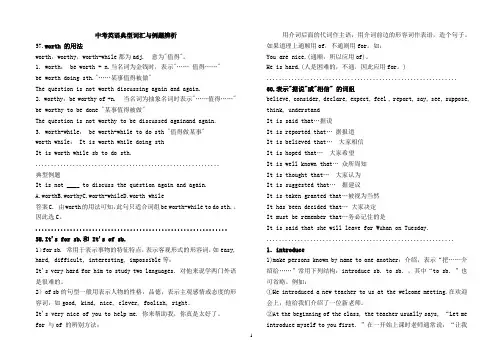
中考英语典型词汇与例题辨析57.worth 的用法worth,worthy,worth-while都为adj.意为"值得"。
1. worth: be worth + n.当名词为金钱时,表示"……值得……"be worth doing sth."……某事值得被做"The question is not worth discussing again and again.2. worthy:be worthy of +n.当名词为抽象名词时表示"……值得……" be worthy to be done "某事值得被做"The question is not worthy to be discussed againand again.3. worth-while: be worth-while to do sth "值得做某事"worth while: It is worth while doing sthIt is worth while sb to do sth. ...........................................................典型例题It is not ____ to discuss the question again and again.A.worthB.worthyC.worth-whileD.worth while答案C. 由worth的用法可知,此句只适合词组be worth-while to do sth.。
因此选C。
............................................................. 58.It's for sb.和 It's of sb.1)for sb. 常用于表示事物的特征特点,表示客观形式的形容词,如easy, hard, difficult, interesting, impossible等:It's very hard for him to study two languages. 对他来说学两门外语是很难的。
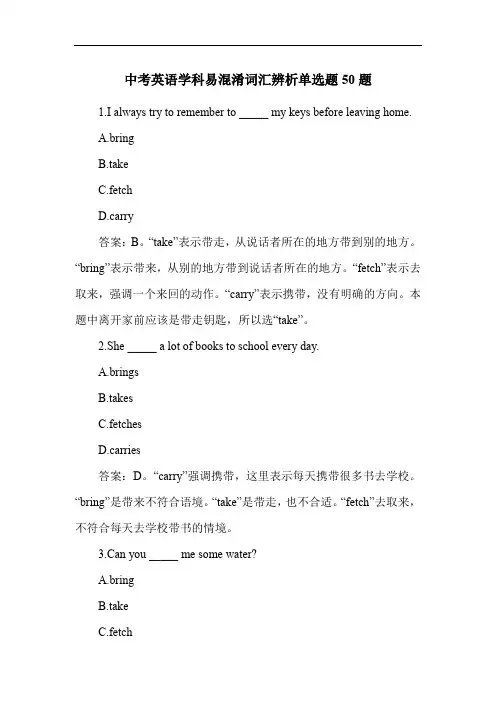
中考英语学科易混淆词汇辨析单选题50题1.I always try to remember to _____ my keys before leaving home.A.bringB.takeC.fetchD.carry答案:B。
“take”表示带走,从说话者所在的地方带到别的地方。
“bring”表示带来,从别的地方带到说话者所在的地方。
“fetch”表示去取来,强调一个来回的动作。
“carry”表示携带,没有明确的方向。
本题中离开家前应该是带走钥匙,所以选“take”。
2.She _____ a lot of books to school every day.A.bringsB.takesC.fetchesD.carries答案:D。
“carry”强调携带,这里表示每天携带很多书去学校。
“bring”是带来不符合语境。
“take”是带走,也不合适。
“fetch”去取来,不符合每天去学校带书的情境。
3.Can you _____ me some water?A.bringB.takeC.fetch答案:A。
“bring”表示带来,这里是让对方给自己带来一些水。
“take”带走不对。
“fetch”去取来,没有“bring”直接。
“carry”携带,不是此处的意思。
4.He went to the library to _____ a book.A.bringB.takeC.fetchD.carry答案:C。
“fetch”表示去取来,去图书馆取一本书符合这个意思。
“bring”带来,从图书馆的角度不是带来。
“take”带走,不太准确。
“carry”携带也不合适。
5.She _____ her baby in her arms.A.bringsB.takesC.fetchesD.carries答案:D。
“carry”表示携带,这里是她把宝宝抱在怀里,用“carry”合适。
“bring”带来不符合。
“take”带走不对。
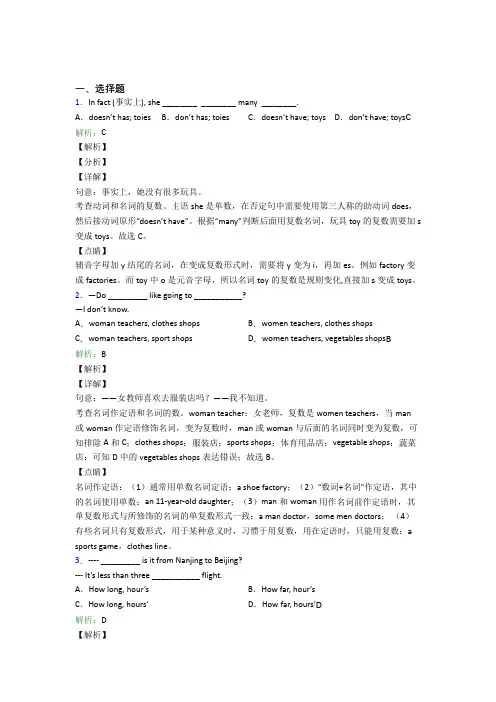
一、选择题1.In fact (事实上), she ________ ________ many ________.A.doesn’t has; toies B.don’t has; toies C.doesn’t have; toys D.don’t have; toys C 解析:C【解析】【分析】【详解】句意:事实上,她没有很多玩具。
考查动词和名词的复数。
主语she是单数,在否定句中需要使用第三人称的助动词does,然后接动词原形“doesn’t have”。
根据“many”判断后面用复数名词,玩具toy的复数需要加s 变成toys。
故选C。
【点睛】辅音字母加y结尾的名词,在变成复数形式时,需要将y变为i,再加es。
例如factory变成factories。
而toy中o是元音字母,所以名词toy的复数是规则变化,直接加s变成toys。
2.—Do _________ like going to ___________?—I don’t know.A.woman teachers, clothes shops B.women teachers, clothes shops C.woman teachers, sport shops D.women teachers, vegetables shops B解析:B【解析】【详解】句意:——女教师喜欢去服装店吗?——我不知道。
考查名词作定语和名词的数。
woman teacher:女老师,复数是women teachers,当man或woman作定语修饰名词,变为复数时,man或woman与后面的名词同时变为复数,可知排除A和C;clothes shops:服装店;sports shops:体育用品店;vegetable shops:蔬菜店;可知D中的vegetables shops表达错误;故选B。
【点睛】名词作定语:(1)通常用单数名词定语:a shoe factory;(2)“数词+名词”作定语,其中的名词使用单数:an 11-year-old daughter;(3)man和woman用作名词前作定语时,其单复数形式与所修饰的名词的单复数形式一致:a man doctor,some men doctors;(4)有些名词只有复数形式,用于某种意义时,习惯于用复数,用在定语时,只能用复数:a sports game,clothes line。
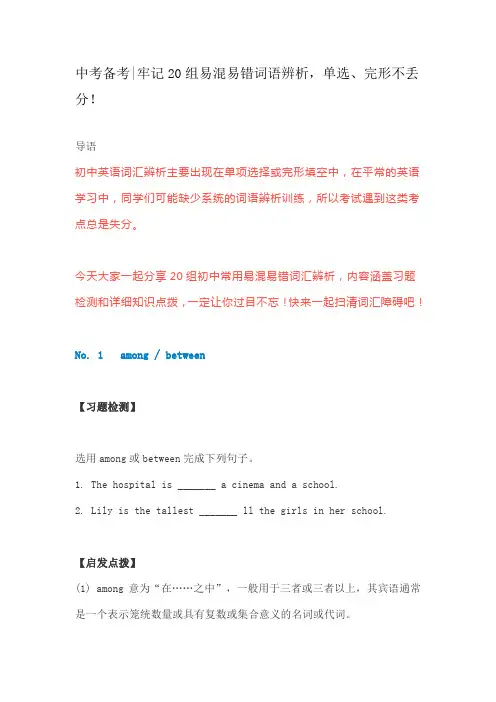
中考备考|牢记20组易混易错词语辨析,单选、完形不丢分!导语初中英语词汇辨析主要出现在单项选择或完形填空中,在平常的英语学习中,同学们可能缺少系统的词语辨析训练,所以考试遇到这类考点总是失分。
今天大家一起分享20组初中常用易混易错词汇辨析,内容涵盖习题检测和详细知识点拨,一定让你过目不忘!快来一起扫清词汇障碍吧!No. 1 among / between【习题检测】选用among或between完成下列句子。
1. The hospital is _______ a cinema and a school.2. Lily is the tallest _______ ll the girls in her school.【启发点拨】(1) among意为“在……之中”,一般用于三者或三者以上,其宾语通常是一个表示笼统数量或具有复数或集合意义的名词或代词。
(2) between一般指两者之间,其宾语通常是表示两者概念的名词或代词,或由and连接的两个具体的人或物。
between有时也可表示多者之中的“两两之间”。
如:Switzerland lies between France, Germany, Austria and Italy.Key:1. between2. amongNo. 2 lay / lie【习题检测】用lay或lie的适当形式完成句子。
1. I _______ the table when my mother cooked the meal.2. John was ill and _______ in bed all morning.【启发点拨】(1) lay作动词,可意为“摆放(餐桌)”,其过去式与过去分词均为laid,现在分词为laying,常用于短语lay the table,意为“摆放餐桌”。
如:Tom was laying the table.(2) lie作动词,意为“躺;平躺”时,过去式为lay,过去分词为lain,现在分词为lying。
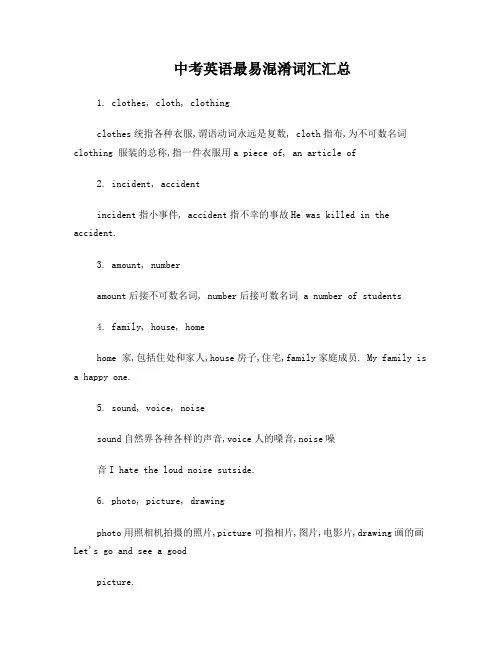
中考英语最易混淆词汇汇总1. clothes, cloth, clothingclothes统指各种衣服,谓语动词永远是复数, cloth指布,为不可数名词clothing 服装的总称,指一件衣服用a piece of, an article of2. incident, accidentincident指小事件, accident指不幸的事故He was killed in the accident.3. amount, numberamount后接不可数名词, number后接可数名词 a number of students4. family, house, homehome 家,包括住处和家人,house房子,住宅,family家庭成员. My family is a happy one.5. sound, voice, noisesound自然界各种各样的声音,voice人的嗓音,noise噪音I hate the loud noise sutside.6. photo, picture, drawingphoto用照相机拍摄的照片,picture可指相片,图片,电影片,drawing画的画Let's go and see a goodpicture.7. vocabulary, wordvocabulary词汇,一个人拥有的单词量,word具体的单词He has a large vocabulary.8. population, peoplepopulation人口,人数,people具体的人 China has a large population.9. weather, climateweather一天内具体的天气状况,climate长期的气候状况The climate here is not good for you.10. road, street, path, wayroad具体的公路,马路,street街道,path小路,小径, way道路,途径take this road; in the street, show me the way to the museum.11. course, subjectcourse课程(可包括多门科目),subject科目(具体的学科)a summer course12. custom, habitcustom传统风俗,习俗,也可指生活习惯,后接to do, habit生活习惯,习惯成自然,后接of doing. I've got the habit ofdrinking a lot.13. cause, reasoncause 指造成某一事实或现象的直接原因,后接ofsth./doing sth,reason用来解释某种现象或结果的理由,后接for sth./doing sth. the reason for being late14. exercise, exercises, practiceexercise运动,锻炼(不可数),exercises练习(可数), practice(反复做的)练习 Practice makesperfect.15. class, lesson作"课"解时,两者可以替换.指课文用lesson. 指班级或全体学生用class. lesson 6; class 516. speech, talk, lecturespeech指在公共场所所做的经过准备的较正式的演说,talk日常生活中的一般的谈话,讲话,lecture学术性的演讲, 讲课 a series of lecture on…17. officer, officialofficer部队的军官,official政府官员 an armyofficer18. work, job二者均指工作。
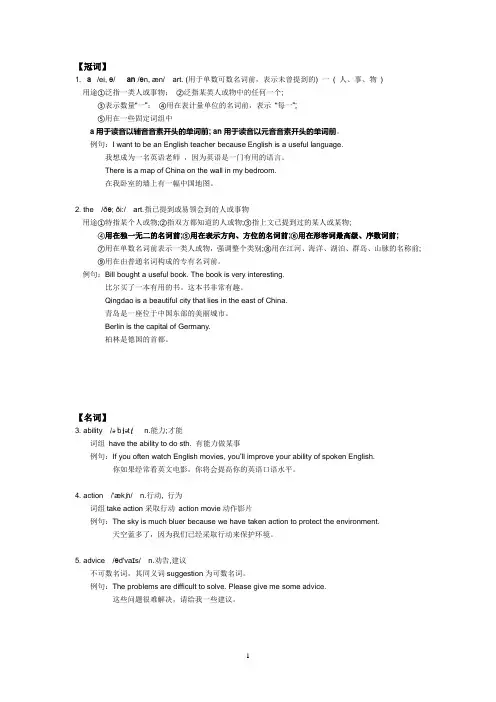
【冠词】1. a /ei, ə/ an /ən, æn/art. (用于单数可数名词前,表示未曾提到的) 一( 人、事、物)用途①泛指一类人或事物;②泛指某类人或物中的任何一个;③表示数量“一”;④用在表计量单位的名词前,表示“每一”;⑤用在一些固定词组中a用于读音以辅音音素开头的单词前; an用于读音以元音音素开头的单词前。
例句:I want to be an English teacher because English is a useful language.我想成为一名英语老师,因为英语是一门有用的语言。
There is a map of China on the wall in my bedroom.在我卧室的墙上有一幅中国地图。
2. the /ðə; ði:/ art.指已提到或易领会到的人或事物用途①特指某个人或物;②指双方都知道的人或物;③指上文已提到过的某人或某物;④用在独一无二的名词前;⑤用在表示方向、方位的名词前;⑥用在形容词最高级、序数词前;⑦用在单数名词前表示一类人或物,强调整个类别;⑧用在江河、海洋、湖泊、群岛、山脉的名称前;⑨用在由普通名词构成的专有名词前。
例句:Bill bought a useful book. The book is very interesting.比尔买了一本有用的书。
这本书非常有趣。
Qingdao is a beautiful city that lies in the east of China.青岛是一座位于中国东部的美丽城市。
Berlin is the capital of Germany.柏林是德国的首都。
【名词】3. ability /əˈbɪlətɪ/ n.能力;才能词组have the ability to do sth. 有能力做某事例句:If you often watch English movies, you’ll improve your ability of spoken English.你如果经常看英文电影,你将会提高你的英语口语水平。
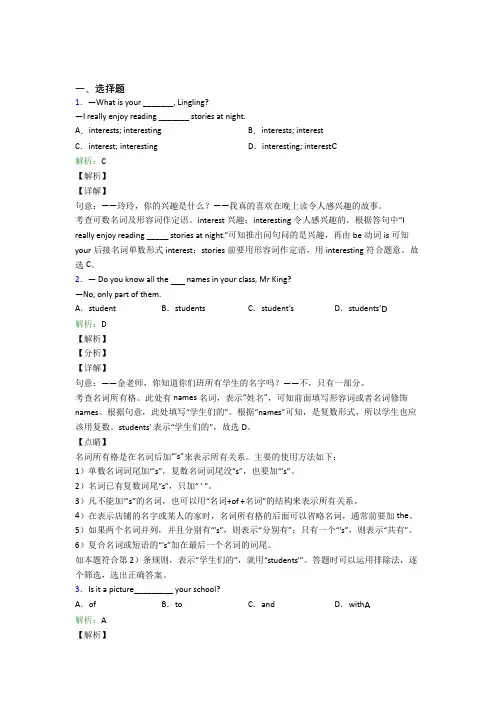
一、选择题1.—What is your _______, Lingling?—I really enjoy reading _______ stories at night.A.interests; interesting B.interests; interestC.interest; interesting D.interesting; interest C解析:C【解析】【详解】句意:——玲玲,你的兴趣是什么?——我真的喜欢在晚上读令人感兴趣的故事。
考查可数名词及形容词作定语。
interest兴趣;interesting令人感兴趣的。
根据答句中“I really enjoy reading _____ stories at night.”可知推出问句问的是兴趣,再由be动词is可知your后接名词单数形式interest;stories前要用形容词作定语,用interesting符合题意。
故选C。
2.— Do you know all the names in your class, Mr King?—No, only part of them.A.student B.students C.student’s D.students’D解析:D【解析】【分析】【详解】句意:——金老师,你知道你们班所有学生的名字吗?——不,只有一部分。
考查名词所有格。
此处有names名词,表示“姓名”,可知前面填写形容词或者名词修饰names。
根据句意,此处填写“学生们的”。
根据“names”可知,是复数形式,所以学生也应该用复数。
students' 表示“学生们的”,故选D。
【点睛】名词所有格是在名词后加“'s”来表示所有关系。
主要的使用方法如下:1)单数名词词尾加“'s”,复数名词词尾没“s”,也要加“'s”。
2)名词已有复数词尾“s”,只加“ ' ”。
3)凡不能加“'s”的名词,也可以用“名词+of +名词”的结构来表示所有关系。

【冠词】1. a /ei, ə/ an /ən, æn/art. (用于单数可数名词前,表示未曾提到的) 一( 人、事、物)用途①泛指一类人或事物;②泛指某类人或物中的任何一个;③表示数量“一”;④用在表计量单位的名词前,表示“每一”;⑤用在一些固定词组中a用于读音以辅音音素开头的单词前; an用于读音以元音音素开头的单词前。
例句:I want to be an English teacher because English is a useful language.我想成为一名英语老师,因为英语是一门有用的语言。
There is a map of China on the wall in my bedroom.在我卧室的墙上有一幅中国地图。
2. the /ðə; ði:/ art.指已提到或易领会到的人或事物用途①特指某个人或物;②指双方都知道的人或物;③指上文已提到过的某人或某物;④用在独一无二的名词前;⑤用在表示方向、方位的名词前;⑥用在形容词最高级、序数词前;⑦用在单数名词前表示一类人或物,强调整个类别;⑧用在江河、海洋、湖泊、群岛、山脉的名称前;⑨用在由普通名词构成的专有名词前。
例句:Bill bought a useful book. The book is very interesting.比尔买了一本有用的书。
这本书非常有趣。
Qingdao is a beautiful city that lies in the east of China.青岛是一座位于中国东部的美丽城市。
Berlin is the capital of Germany.柏林是德国的首都。
【名词】3. ability /əˈbɪlətɪ/ n.能力;才能词组have the ability to do sth. 有能力做某事例句:If you often watch English movies, you’ll improve your ability of spoken English.你如果经常看英文电影,你将会提高你的英语口语水平。
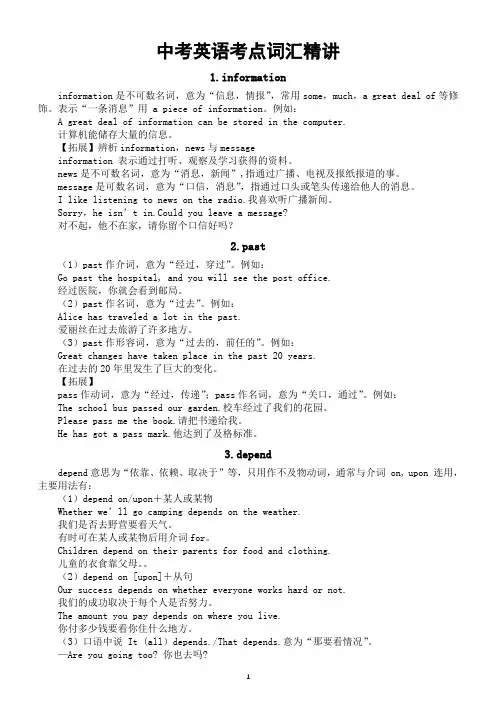
中考英语考点词汇精讲rmationinformation是不可数名词,意为“信息,情报”,常用some,much,a great deal of等修饰。
表示“一条消息”用 a piece of information。
例如:A great deal of information can be stored in the computer.计算机能储存大量的信息。
【拓展】辨析information,news与messageinformation 表示通过打听、观察及学习获得的资料。
news是不可数名词,意为“消息,新闻”,指通过广播、电视及报纸报道的事。
message是可数名词,意为“口信,消息”,指通过口头或笔头传递给他人的消息。
I like listening to news on the radio.我喜欢听广播新闻。
Sorry,he isn’t in.Could you leave a message?对不起,他不在家,请你留个口信好吗?2.past(1)past作介词,意为“经过,穿过”。
例如:Go past the hospital, and you will see the post office.经过医院,你就会看到邮局。
(2)past作名词,意为“过去”。
例如:Alice has traveled a lot in the past.爱丽丝在过去旅游了许多地方。
(3)past作形容词,意为“过去的,前任的”。
例如:Great changes have taken place in the past 20 years.在过去的20年里发生了巨大的变化。
【拓展】pass作动词,意为“经过,传递”;pass作名词,意为“关口,通过”。
例如:The school bus passed our garden.校车经过了我们的花园。
Please pass me the book.请把书递给我。
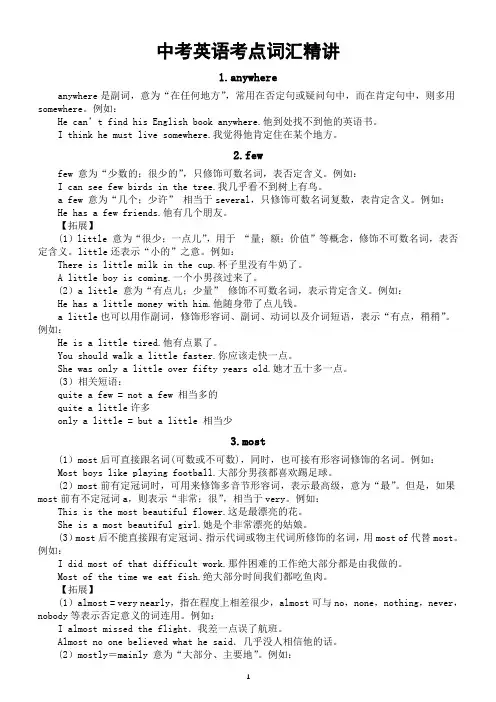
中考英语考点词汇精讲1.anywhereanywhere是副词,意为“在任何地方”,常用在否定句或疑问句中,而在肯定句中,则多用somewhere。
例如:He can’t find his English book anywhere.他到处找不到他的英语书。
I think he must live somewhere.我觉得他肯定住在某个地方。
2.fewfew 意为“少数的;很少的”,只修饰可数名词,表否定含义。
例如:I can see few birds in the tree.我几乎看不到树上有鸟。
a few 意为“几个;少许”相当于several,只修饰可数名词复数,表肯定含义。
例如:He has a few friends.他有几个朋友。
【拓展】(1)little 意为“很少;一点儿”,用于“量;额;价值”等概念,修饰不可数名词,表否定含义。
little还表示“小的”之意。
例如:There is little milk in the cup.杯子里没有牛奶了。
A little boy is coming.一个小男孩过来了。
(2)a little 意为“有点儿;少量”修饰不可数名词,表示肯定含义。
例如:He has a little money with him.他随身带了点儿钱。
a little也可以用作副词,修饰形容词、副词、动词以及介词短语,表示“有点,稍稍”。
例如:He is a little tired.他有点累了。
You should walk a little faster.你应该走快一点。
She was only a little over fifty years old.她才五十多一点。
(3)相关短语:quite a few = not a few 相当多的quite a little许多only a little = but a little 相当少3.most(1)most后可直接跟名词(可数或不可数),同时,也可接有形容词修饰的名词。
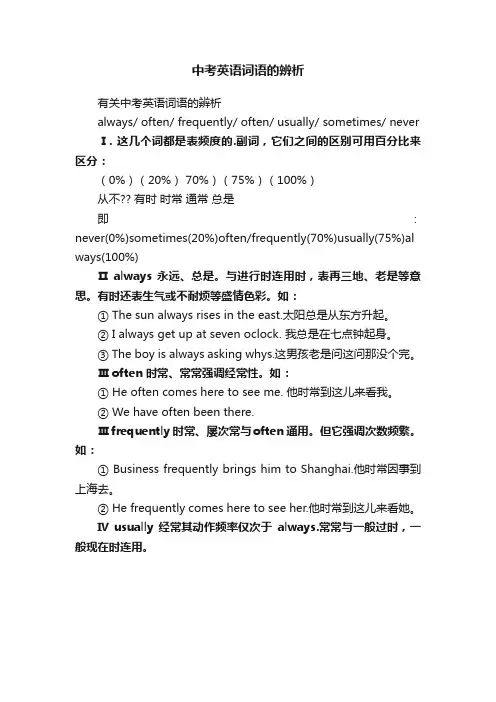
中考英语词语的辨析
有关中考英语词语的辨析
always/ often/ frequently/ often/ usually/ sometimes/ never
Ⅰ. 这几个词都是表频度的.副词,它们之间的区别可用百分比来
区分:
(0%)(20%) 70%)(75%)(100%)
从不?? 有时 时常 通常 总是
即:
never(0%)sometimes(20%)often/frequently(70%)usually(75%)al
ways(100%)
Ⅱ always 永远、总是。与进行时连用时,表再三地、老是等意
思。有时还表生气或不耐烦等盛情色彩。如:
① The sun always rises in the east.太阳总是从东方升起。
② I always get up at seven oclock. 我总是在七点钟起身。
③ The boy is always asking whys.这男孩老是问这问那没个完。
Ⅲ often 时常、常常强调经常性。如:
① He often comes here to see me. 他时常到这儿来看我。
② We have often been there.
Ⅲ frequently 时常、屡次常与often 通用。但它强调次数频繁。
如:
① Business frequently brings him to Shanghai.他时常因事到
上海去。
② He frequently comes here to see her.他时常到这儿来看她。
Ⅳ usually 经常其动作频率仅次于always.常常与一般过时,一
般现在时连用。
一、易错点之易混淆的形近词组1.In front of和in the front of解析:In front of强调在范围外的前面; 而in the front of指在范围内的前面。
例如:The boy sits in the front of the classroom.男孩坐在教室前面。
(这里强调是在教室里面的前排位置)The girl stands in front of the room.女孩站在房间的前方。
(强调在房间外面的前方位置)2.in place of和in the place of解析:in place of代替,等同于insted of; 而in the place of表示在...地方例如:We use gas in place of coal in cooking.我们用煤气代替煤作饭.A new building is being built in the place of the old one.一座新的建筑物正在原来所在建筑物的地方被建。
3.No more than和not more than解析:no more than表示仅仅,只有,相当于only,理解为不多;而not more than表示至多,不超过,小于的意思。
例如:He is no more than an ordinary English teacher. 他只不过是个普通的英文老师。
He has not more than three children. 他最多3 个孩子(有或许还不到三个)4.On earth和on the earth解析:两者都有在地上,在地球上的意思,但on earth还有到底,究竟的意思;On the earth只是单纯的表示在地上,在地球上例如:where on earth did you spring from?你究竟从哪里冒出来的?What if there was no lead on the earth at all?如果地球上根本就没有铅这种物质怎么办?5.At all和after all解析:at all表示根本,全然的意思,常用短语not at all表示一点也不;after all表示到底,毕竟的意思例如:I don't know him at all. 我根本不认识他。
矿产资源开发利用方案编写内容要求及审查大纲
矿产资源开发利用方案编写内容要求及《矿产资源开发利用方案》审查大纲一、概述
㈠矿区位置、隶属关系和企业性质。
如为改扩建矿山, 应说明矿山现状、
特点及存在的主要问题。
㈡编制依据
(1简述项目前期工作进展情况及与有关方面对项目的意向性协议情况。
(2 列出开发利用方案编制所依据的主要基础性资料的名称。
如经储量管理部门认定的矿区地质勘探报告、选矿试验报告、加工利用试验报告、工程地质初评资料、矿区水文资料和供水资料等。
对改、扩建矿山应有生产实际资料, 如矿山总平面现状图、矿床开拓系统图、采场现状图和主要采选设备清单等。
二、矿产品需求现状和预测
㈠该矿产在国内需求情况和市场供应情况
1、矿产品现状及加工利用趋向。
2、国内近、远期的需求量及主要销向预测。
㈡产品价格分析
1、国内矿产品价格现状。
2、矿产品价格稳定性及变化趋势。
三、矿产资源概况
㈠矿区总体概况
1、矿区总体规划情况。
2、矿区矿产资源概况。
3、该设计与矿区总体开发的关系。
㈡该设计项目的资源概况
1、矿床地质及构造特征。
2、矿床开采技术条件及水文地质条件。
中考英语易混词汇辨析1. clothes, cloth, clothingclothes统指各种衣服,谓语动词永远是复数cloth指布,为不可数名词clothing服装的总称,指一件衣服用a piece of, an article of2. incident, accidentincident指小事件, accident指不幸的事故He was killed in the accident.3. amount, numberamount后接不可数名词,number后接可数名词 a number of students4. sound, voice, noisesound自然界各种各样的声音,voice人的嗓音,noise噪音I hate the loud noise outside.5. photo, picture, drawingphoto用照相机拍摄的照片,picture可指相片,图片,电影片,drawing画的画Let's go and see a good picture.6. weather, climateweather一天内具体的天气状况,climate长期的气候状况The climate here is not good for you.7. road, street, path, wayroad具体的公路,马路,street街道,path小路,小径,way道路,途径take this road; in the street, show me the way to the museum.8. course, subjectcourse课程(可包括多门科目),subject科目(具体的学科)a summer course9. custom, habitcustom传统风俗,习俗,也可指生活习惯,后接to do,habit生活习惯,习惯成自然,后接of doing.I've got the habit of drinking a lot.10. cause, reasoncause指造成某一事实或现象的直接原因,后接of sth./doing sth,reason用来解释某种现象或结果的理由,后接for sth./doing sth. the reason for being late11. exercise, exercises, practiceexercise运动,锻炼(不可数),exercises练习(可数),practice(反复做的)练习Practice makes perfect.12. class, lesson作"课"解时,两者可以替换.指课文用lesson.指班级或全体学生用class. lesson 6; class 513. speech, talk, lecturespeech指在公共场所所做的经过准备的较正式的演说,talk日常生活中的一般的谈话,讲话,lecture学术性的演讲,讲课 a series of lecture on…14. work, job二者均指工作。
2019中考英语常用同义词辨析(72)opinion, view, sentiment, idea这些名词均含“意见,看法,见解”之意。
opinion :普通用词,使用广泛。
多指初步的或缺证据支持因而不十分肯定的意见或看法。
view :侧重指个人对较广泛或重大问题所持的看法,常用复数形式。
sentiment :着重指基于情感而非推理所得出的,已经固定了的看法,常用复数形式。
idea :普通用词,通常指凭感觉和想象所形成的看法或意见。
opponent, competitor, enemy, foe, rival这些名词均有“对手,敌手”之意。
opponent :最常用词,通常指在争论、辩论、竞选或竞赛以及其它各种矛盾冲突中站在对立面的“对手”或“敌手”。
competitor :指为同一目标或目的竞争者,一般无感情色彩。
enemy :多指充满敌意的仇敌。
foe :语气较强,多用于书面文字和诗歌中。
指不但敌对,而且很危险,怀有很深的敌意。
rival :指与某人目标一致而想赶上或超过他的人,匹敌者。
oppose, defy, withstand, resist这些动词均含有“反抗,抵抗”之意。
oppose :普通用词,可表不同水准的抵抗。
defy :指公开地、勇敢地反对或抵抗,有时含公然挑衅之意。
withstand :较正式用词,指坚强地抵抗攻击或压力,有时也指抗住影响或吸引力。
resist :指积极地反抗一种攻击或暴力,或诱惑。
opposite, contrary, adverse, reverse, converse这些形容词均含“相反的,对立的”之意。
opposite :指位置、方向、行动或想法等完全相反。
contrary :一般指与某种主张、看法或行为等正好相反,隐含否定一方并不意味着肯定另一方的意味。
adverse :通常指违害利益的、无生命的势力或条件等,侧重分歧。
reverse :指朝相反方向的或反面(背面)的。
词汇辨析1.My friends _________ me seeing a movie after school, but I thought it was a waste of time. A.suggested B.decided C.advised D.asked 2.Chinese soldiers often help people in trouble, ________ they know it is dangerous.A.so B.although C.but D.because3.Gu Ailing worked ________ hard ________ she got excellent achievements at the Beijing 2022 Winter Olympic Games.A.not only … but also B.such ... that C.not ... until D.so … that4.After helped by the police, the boy thanked them ________ a big smile.A.at B.to C.with D.on5.More and more ________ want to learn about Chinese culture.A.Germans B.German C.Germany D.Germans’6.I don’t like noodles and my cousin Amy doesn’t like them, ________.A.too B.either C.also D.as well7.— Is this pen ________, Tina?— No, it isn’t. It’s Linda’s.A.you B.yours C.your D.yourself8.Lucy has two brothers. One is a worker, ________ is a teacher.A.other B.others C.the others D.the other9.He isn’t ________ to go to school.A.old enough B.enough old C.big enough D.enough big 10.She bought a digital camera online ________ she would save a lot of time.A.so that B.as soon as C.no matter D.such that11.—It will __________ us three weeks to finish the project.—That is not fast enough. We need to hurry.A.cost B.spend C.take12.—What are you doing?—I’m expecting a letter from my friend.A.writing B.sending C.waiting for13.________ is something that you own or that you are carrying with you at a certain time. A.Invitation B.Audience C.Possessions14.—It is raining cats and dogs outside. Would you please ________ your umbrella with me?—No problem.A.raise B.borrow C.share15.—Do you mind if I take my puppy to work tomorrow?—No. not at all! I love animals.A.care B.agree C.notice16.—This dress looks good on you, sweetheart.— Mum, don’t make me wear this, please. It is so out of date.A.traditional B.unpopular C.fashionable 17.—Which cup do you want?—I can’t make a decision. Which one do you think is the prettiest?A.choice B.change C.preparation 18.—Which would you like, tea or coffee?—Either _______ OK, but I prefer coffee _______ milk.A.is; to B.are; with C.is; with19.—Dong Qing is a celebrated host. She is popular with people of all ages in China. Do you like her?— Of course. She is not only beautiful but also knowledgeable.A.satisfied B.famous C.popular 20.—Couldn’t you see the ______ on the wall?—It says, “No smoking!”A.word B.sign C.wood21.The athlete was ________ that he had let his fans down.A.ashamed B.pleased C.excited22.Her job is to write comments about films on the website.A.actions B.reviews C.topics23.Before an exam, it’s important to stay relaxed and calm.A.not asleep B.excited C.not worried24.I suggest that we put off the sports meeting.A.avoid B.advise C.mind25.—Have you ________ your opinion at the meeting?—Yes, I clearly said that I wouldn’t agree with them.A.stated B.communicated C.supposed26.—Did you participate in the ________ on people’s hobbies?—Yeah. We did it ________ 450 families and the result was surprising.A.research; between B.activity; with C.survey; among27.We have the latest e-products on sale. (选出与画线部分意思相同或相近的一项)A.oldest B.most expensive C.newest D.cheapest 28.Paula got the first place in the exam, and then she treated herself ________ a new dress. A.to B.on C.by D.about29.Our teachers are very strict ________ us.A.with B.to C.on30.It’s time _______ lunch. Let’s go to the dining room.A.for B.to C.of D.at31.The famous film will be ________ TV soon.A.in B.at C.on D.with32.—Do you know students in Suzhou have returned to school since the government ________ the spread of Omicron?—Yes. Everyone is glad to see it.A.completed B.continued C.controlled D.confirmed 33.The astronauts in Shenzhou-13 had real-time ________ with the ground classrooms in five cities to spread the knowledge of space to the young people.A.conclusion B.competition C.contribution D.communication 34.It ________ like the singing of the birds.A.sounds B.looks C.smells D.tastes35.The poor boy made a living _______ selling newspapers on the train.A.with B.in C.by D.on36._________ the questions were difficult, Angela answered them correctly.A.Since B.Because C.Although D.If37.The facts are clearly ________ in the report.A.stated B.said C.told D.talked 38.Read the book carefully and write a book ________.A.diary B.review C.report D.story 39.She ________ him to lunch.A.gave B.treated C.served D.got40._______ I want to have a colour TV, I have to buy a black and white one at last. A.Although B.Since C.Because D.As 41.—What do you think of playing the piano?—I find ________ really interesting.A.that B.those C.what D.it42.I go to school by bus ________ weekdays.A.in B.at C.on D.to43.Once _______ a time there lived a king, who had three daughters.A.on B.upon C.in D.during44._________ his novel, I like this best.A.Between B.Among C.Besides D.About 45.Are you married or still _______?A.single B.only C.one D.double 46.He ________ me at tennis.A.won B.beat C.lose D.bet47.She is very busy. She is very willing to help you, ________.A.though B.if C.although D.but48.You can meet Mr. James _______ 8 a.m. and 11 a.m.A.between B.among C.from D.before 49.You _________ pay too much attention to your reading skill as it’s very important. A.shouldn’t B.needn’t C.mustn’t D.can’t50.In character-training of children, what really _________ is what their parents say and do.A.considers B.cares C.matters D.Minds参考答案:1.A【详解】句意:我的朋友建议我课后看电影,但我认为这很浪费时间。